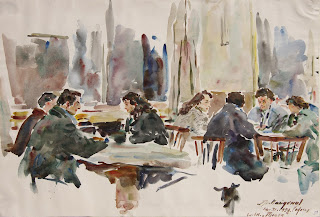For the past 23 years I have wandered in central Europe, the
Balkans, Central Asia and the Caucasus – spending an average of 2 years in some
eleven countries and having about 30 different homes. Verily I am a nomad - although,
for the past 5 years, with bases in the Carpathian Mountains, Bucharest and Sofia.
Hardly surprising therefore that I am drawn to travel literature – the scribbles
of those who seek to give us a sense of life in other places.
Jan Morris is one
of my favourites (the link gives a marvellous interview with her by the indominatable
Paris Review) – but I have been overwhelmed in recent days by a post-modernist account of
this genre which I found on the internet – about British travel in the Balkans
in the last century - complete with about 500 bibliographical references……The
version I have is a PhD thesis -
The Debated Lands which looks first at the motifs of discord, savagery, backwardness and
obfuscation which characterise the 19
th century books on the area. In the approach
to the First World War all of at changed; specific countries were embraced by economic and military alliances and some countries acquired what has been called a "pet state" status -
Todorova sums up as the pet state approach to south-east
Europe: the choosing from amongst the Balkan states a people whose predicaments
to abhor, whose history and indigenous leaders to commend, whose political
grievances to air, and whose national aspirations to advocate. Along with
challenging the discourse's imperialist tendencies, national advocacy would
undercut both the denigratory format of dominant balkanism and its racialist
codifications of the Balkan peninsula as a homogenised zone of misfortune and
degeneracy with writers retaining the denigratory approach even as they
delineated - without any awareness of the paradox -a people that apparently
broke with the imputed essence. In this way, Trevor's valorisation of the
Montenegrins, Vivian's romanticisation of the Serbs, Upward's endorsement of
the Greeks, or Peacock's and Durham’s clear preference for the Albanians, are
all based on contrasting the positive attributes of their chosen peoples with
the thoroughly negative qualities of the Balkan ethnicities surrounding them; a
source of genuine confusion for the general reader, no doubt, who might find
the Serbians, say, lauded against the Bulgarians in one text, and then the very
opposite in the next…….
Until reading the book, I had not realised, for example, how many British women volunteered for duty in the Serbian field hospitals and how media and literary coverage of this phenomenon brought that country into the British consciousness - and how positively. That was followed by a strand of writing in the late 1920s
which took the romanticisation into deeper territory – with a revolt against
western modernity and mass society -
By the 1920s, Foster Fraser's misgivings about western
society had not only become a prevailing feature of British travel writing on
the Balkans, but gained widespread expression within intellectual circles of
the day. The pace of modernisation had already been alarming such influential
commentators as Arnold, Ruskin and Tennyson in the latter half of the
nineteenth century. The economic rate of growth of Britain, France and Germany
had reached unprecedented levels, industrial development and exports were
greater than ever, producing via rapidly burgeoning empires, a global network of commercial and financial influence. Urbanisation
had been radically altering the forms and values of national life, as well as
eroding England's enduringly pastoral self-image and technology was achieving
bewildering levels of progress.
In the place of Victorian certainty came a sudden surge in scepticism,
as Freud and Bergson challenged rationality and objectivity, feminism challenged
patriarchal assumptions, working class radicalism increasingly threatened middle
class security, and science asked ever more pertinent questions of
Christianity. During the second decade of that century, even those who had put
their faith in science and progress were to find that faith severely tested.
From the end of the First World War until the outbreak of
the Second, travellers were finding in this previously depraved corner of
Europe…. " a peace, harmony, vivacity and pastoral beauty in utmost contrast
to the perceived barrenness of the West, and which produced benefits for those weary
of modernity that ranged from personal rejuvenation to outright revelation. According
to this alternative balkanism, violence had disappeared from the region, savagery
became tamed, obfuscation turned to honesty and clarity, and the extreme backwardness
that had formerly been the gauge of Balkan shortcoming was now the very measure
by which it was extolled. For many travellers, any mystery that did remain around
the geographical object became less the marker of a befuddled and dishonest culture
than a vital indication of spiritual depth…….
When placed in the context of the extreme denigration of
earlier periods, the speed with which an established representational paradigm,
its accumulated motifs and evaluations becoming rapidly outmoded, could be
rejected, dismantled, and utterly brushed aside in written record was
remarkable in the extreme.
Trickling out in 1915, and reaching a flood by 1916, the
textual sources of knowledge on Serbia elevated it into a complex, reliant,
independent, `plucky little nation'' far more germane to the modern
requirements of power. ……


